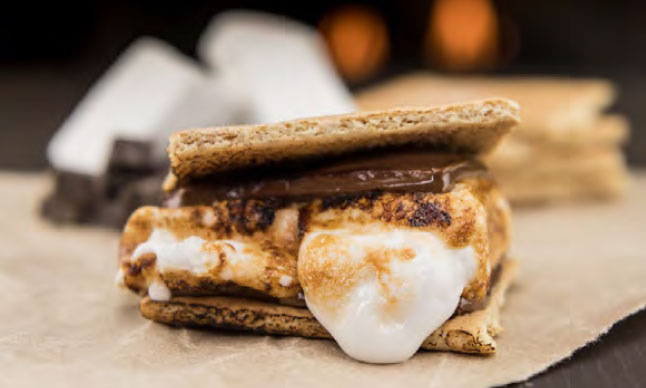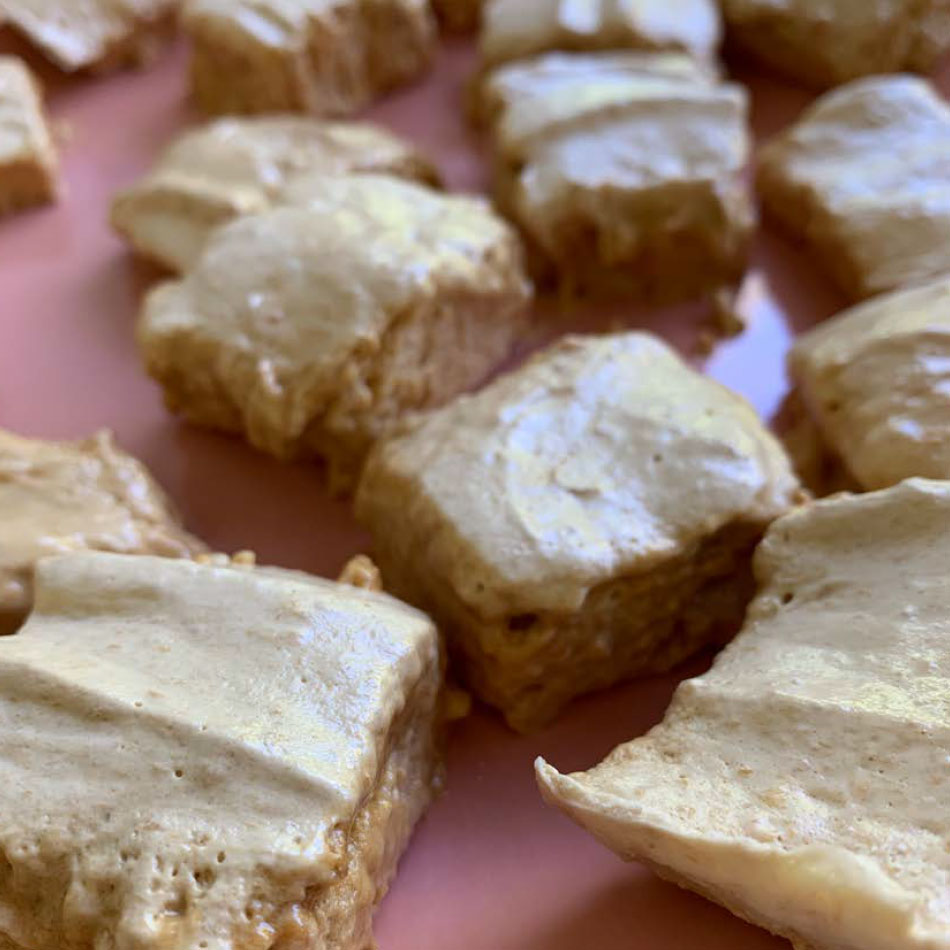Soft, Sweet and Spongy Science
Make vegetarian marshmallows in time for campfire season
- All
- Things to Make
- Fun With Food

What you’ll need:
Equipment:
- 20 x 20 cm baking tin
- Cling wrap
- Kitchen scale (or measuring cups)
- Measuring spoons
- Medium saucepan
- Small saucepan
- Candy thermometer
- Electric mixer (preferably stand)
- Palette knife or spatula
- Sieve
- Sharp knife
Ingredients:
- 250 g (1 ½ cups + 1 tbsp) icing sugar
- 250 g (2 cups + 1 tbsp + 1 tsp) corn starch
- 2 tsp agar powder
- 200 ml (3/4 cup + 1 tbsp) water
- 200 g (1 cup + 2 tsp) granulated sugar
- 100 g (1/3 cup) corn syrup
- 3 egg whites
- 1 tsp xanthan gum
- 1/4 tsp cream of tartar
- 2 tsp vanilla bean paste
- Hot water to heat knife

1. Prepare:
Combine the icing sugar and corn starch to create a dusting mix.
Line the baking tin with cling wrap and, with the sieve, dust with some of the sugar and corn starch mix.
Dissolve the agar powder in 120 ml of water in a small saucepan and set aside.
2. Combine:
Mix the sugar, corn syrup and remaining water in the medium saucepan and bring to a boil to make sugar syrup. Cook the mixture until it reaches 120°C on the candy thermometer and remove from heat.
Put the agar mixture on the heat, bring to a boil and cook for one minute, stirring constantly.
Combine the egg whites, xanthan gum, cream of tartar and vanilla, beating on medium speed until stiff approximately 4 minutes). Slowly pour the sugar syrup into the egg white mixture, keeping your mixer on a medium speed. Increase the speed, and continue to beat for 2 minutes.
Add in the cooked agar mix and beat for an additional 12-15 minutes on high speed until the mixture is stiff and produces ribbons.
Pour the mixture into the prepared baking tin and smooth with a damp palette knife or spatula. Leave to set overnight at room temperature.
3. Cut:
Using a sieve, dust a work surface with a thick layer of the dusting mix.
Take the marshmallow out of the baking tin, using the cling wrap to lift, and place it top down on the work surface. Remove the cling wrap and discard.
Dip a sharp knife in hot water. Carefully trim the marshmallow slab, removing uneven edges, and then cut into squares. Roll squares in the dusting mix and leave to dry for 24 hours before eating.
Store marshmallows in an airtight container at room temperature for up to 5 days.
Recipe adapted from The Happy Foodie.
How does it work?
Long ago people made marshmallows with ingredients from the marsh mallow plant. In most modern marshmallows, gelatin replaces the thick, gluey substance from the marsh mallow plant. Gelatin is derived from collagen found in the bones, skin and connective tissue of animals and it has the ability to coagulate—or come together—when beaten. Donʼt eat animal products? Never fear! Agar, derived from marine algae, is a vegetarian-friendly gelatin substitute that forms a jelly when dissolved in water. When the jelly is beaten into the mixture, air bubbles form and the agar coagulates around those bubbles, stabilizing them so their walls donʼt collapse. These pockets of air make the marshmallows soft and spongy.
The science of toasting marshmallows
Marshmallows contain water and lots of sugar, but theyʼre mostly air—making them a foam (a water-based solution with tiny bubbles dispersed throughout). In fact, air makes more than half a marshmallowʼs total volume!
Over a campfire, the air within the marshmallow expands. The heat also causes the water to evaporate, which means it, too, expands. Thatʼs what makes the marshmallow puff up. High temperatures also cause sugars to change composition—a chemical process called caramelization—creating a delicious, crisp brown crust on the outside of the marshmallow.
Sadly, vegetarian marshmallows donʼt hold up very well when toasted over a campfire. They melt and collapse. But never fear! Line them up on a baking sheet and broil on low in the oven (or toaster over) until the tops turn golden brown. Watch carefully to make sure they donʼt burn!